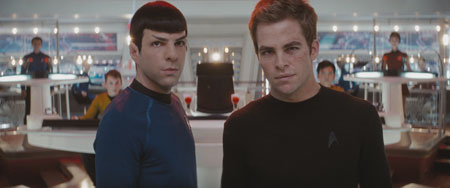Star Trek

Intimate. That’s the first word that comes to my mind when I attempt to analyze J.J. Abrams’ take on the now forty-three year old space western. Much has been made about how and why his predecessors, Brannon Braga and Rick Berman, failed in the years lacking the late Gene Roddenberry’s guidance.
There is the obvious intimacy between James T. Kirk (Chris Pine) and Spock (Zachary Quinto). In order for a relationship to be meaningful, there must be tension for the actors’ natures to work against. If the franchise had grown stale, Braga take note, it’s because the characters lacked meaningful, realistic bonds forged from idiosyncratic dissonance and character flaws… with one exception: In Star Trek: First Contact, arguably the only good movie of “The Next Generation,” there is a scene in which the talented Alfre Woodard verbally jabs Picard and reveals his hypocrisy, causing him to unravel. But following that, we were given a universe in which it seemed everybody pretty much agreed with and/or liked each other, and no truly devastating conflicts of personality ensued. We should have known that Spock was really thinking outside of the frame when he said to Kirk in Star Trek VI: The Undiscovered Country, “Could it be that we two, you and I, have grown so old and so inflexible that we have outlived our usefulness? Would that constitute a joke?”
In this re-imagined timeline, changed for plot reasons that I consider less important and partially so because every other review published will tell you about them, Kirk and Spock’s destinies are pushed apart by happenstance (some will argue it is a Deus ex machina… but isn’t life full of them?). Their personalities become diametrically-opposed, yet the cause is something they have in common.
This is only the catalyst for a film with intimacy on more levels than any other “Trek” outing prior. Kirk and Spock are constantly shown invading each other’s personal space. Camera angles on the actors are tighter. Space battles are less densely populated, and CG has been cleverly used to reveal more detail in close ups around the edges of hulking ships that manuever ponderously around one another as hulking ships should. Instead of a fracas of thousands of ships shot in so wide a panorama they might as well all be Doritos and potatoes having a food fight in space (battles in the Star Wars prequels come to mind) you are placed in dangerous proximity, able to observe thoughtful details such as the gyroscopic pods from which phasers are fired.
That isn’t to say that we find ourselves mired in the technobabble that destroyed later television episodes of the various series. Not at all. Abrams, a total outsider to this science fiction staple, deftly returned to the human component that Gene Roddenberry, a former navigator turned writer/producer, had an instinct for charting. Each character is finally given some backstory, even the deplorable Chekov (Anton Yelchin). Karl Urban plays Dr. Leonard “Bones” McCoy with great reverence to DeForest Kelley, the late actor whose personal input was consulted in the creation of the iconic, irritable country doctor. Simon Pegg’s manic version of the beloved Chief Engineer Montgomery Scott is hilarious. Zoë Saldana as Uhura is given a level of expertise more befitting a communications officer than, unfortunately, had been offered her predecessor. But the center is, has, and always will be the unspoken bond between “mind” and “body”, as Manohla Dargis of the New York Times ingeniously characterized the fabled Spock and Kirk, respectively.
To me, the main plot itself is uninteresting. It involves Nero (Eric Bana, in his most boring performance since… well, his last film), a rogue Romulan who seeks revenge for the destruction of his planet. Much more fascinating, as our Vulcan protagonist might say, is seeing where these space cadets come from and how they pull themselves together to defeat the Plot Device, err, Nero. There are, of course, numerous nods to Treks past, for the die hard fans who will grin from ear to ear when Kirk bites an apple after defeating a certain simulation involving a no-win scenario. However, ultimately the film will go down, and endearingly so, as the Brokeback Mountain of space operas… In all the cosmos, a fatherless human and a motherless Vulcan find in one another that which they had lost.
 Star Trek • Dolby® Digital surround sound in select theatres • Aspect Ratio: 2.35:1 • Running Time: 126 minutes • MPAA Rating:PG-13 for sci-fi action and violence, and brief sexual content. • Distributed by Paramount Pictures
Star Trek • Dolby® Digital surround sound in select theatres • Aspect Ratio: 2.35:1 • Running Time: 126 minutes • MPAA Rating:PG-13 for sci-fi action and violence, and brief sexual content. • Distributed by Paramount Pictures
